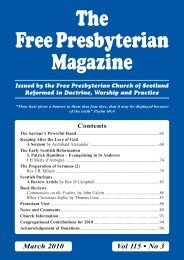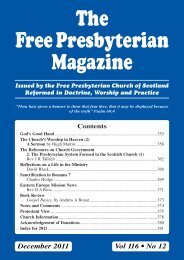May - the Free Presbyterian church of Scotland
May - the Free Presbyterian church of Scotland
May - the Free Presbyterian church of Scotland
Create successful ePaper yourself
Turn your PDF publications into a flip-book with our unique Google optimized e-Paper software.
Lydia’s Conversion 147<br />
sieged with John Knox in <strong>the</strong> Castle at St Andrews. His Confession <strong>of</strong> Faith<br />
or Treatise on Justification by Faith was composed in Rouen and revised by<br />
Knox in <strong>the</strong> galleys. It was not published until 1584. It is an account <strong>of</strong> “how<br />
<strong>the</strong> troubled man should seek refuge at his God”, and after expounding <strong>the</strong><br />
doctrine <strong>of</strong> justification he goes on to practical considerations. Knox provided<br />
some chapter descriptions and one <strong>of</strong> <strong>the</strong>se is: “The devilish doctrine <strong>of</strong><br />
pestilent Papistical priests”. In one chapter <strong>the</strong>re is a fairly full denunciation<br />
<strong>of</strong> Romanism, including “<strong>the</strong> superstitious worshipping <strong>of</strong> saints; going on<br />
pilgrimage; purging in purgatory; hallowing <strong>of</strong> water or o<strong>the</strong>r elements;<br />
foundation <strong>of</strong> masses to public or private idolatry . . . forbidding <strong>of</strong> marriage<br />
in <strong>the</strong> Church <strong>of</strong> God; and abominable abuses <strong>of</strong> <strong>the</strong> whole Christian religion<br />
by <strong>the</strong> shaven, oincted or smeared priests, bishops, monks and friars, having<br />
only <strong>the</strong>ir vocation <strong>of</strong> man and by man”. Again, it was evidently separation<br />
ra<strong>the</strong>r than reform from within that was in mind. The whole Roman system<br />
was seen to be rotten.<br />
Lydia’s Conversion 1<br />
James Buchanan<br />
ommon to all <strong>the</strong> cases <strong>of</strong> conversion in Scripture is this important point:<br />
C<strong>the</strong> direct operation <strong>of</strong> <strong>the</strong> Holy Spirit on <strong>the</strong> mind <strong>of</strong> every true convert<br />
to <strong>the</strong> Christian faith – by way <strong>of</strong> applying <strong>the</strong> truth. This point deserves our<br />
most serious consideration. Christ Himself specially referred to <strong>the</strong> agency<br />
<strong>of</strong> <strong>the</strong> Spirit in one <strong>of</strong> His last addresses to His disciples before He died. By<br />
comparing His words with o<strong>the</strong>r passages <strong>of</strong> Scripture, we learn that <strong>the</strong>re<br />
were two very different ways in which <strong>the</strong> Spirit would act to carry into effect<br />
His great plan.<br />
The one is external, and affects <strong>the</strong> senses; <strong>the</strong> o<strong>the</strong>r is internal, and spiritual.<br />
We read <strong>of</strong> “<strong>the</strong> manifestation <strong>of</strong> <strong>the</strong> Spirit which is given to every man<br />
to pr<strong>of</strong>it withal”; and we read <strong>of</strong> <strong>the</strong> indwelling <strong>of</strong> <strong>the</strong> Spirit in <strong>the</strong> hearts <strong>of</strong><br />
true believers. In o<strong>the</strong>r words, <strong>the</strong> dispensation <strong>of</strong> <strong>the</strong> gospel is called <strong>the</strong><br />
“ministration <strong>of</strong> <strong>the</strong> Spirit”, for two distinct reasons: first, on account <strong>of</strong><br />
<strong>the</strong> miraculous gifts which were granted to <strong>the</strong> apostles and first converts;<br />
second, on account <strong>of</strong> <strong>the</strong> enlightening, converting and sanctifying grace<br />
which rendered <strong>the</strong> gospel effectual for <strong>the</strong>ir salvation.<br />
There is a wide difference between <strong>the</strong> two. They differ in <strong>the</strong>ir nature,<br />
<strong>the</strong>ir use and <strong>the</strong>ir effects. The one is an appropriate evidence, a divine<br />
1 Reprinted with editing, from <strong>the</strong> “Illustrative Cases <strong>of</strong> Conversion” in The Office and<br />
Work <strong>of</strong> <strong>the</strong> Holy Spirit. It is based on Acts 16:13-15.

















